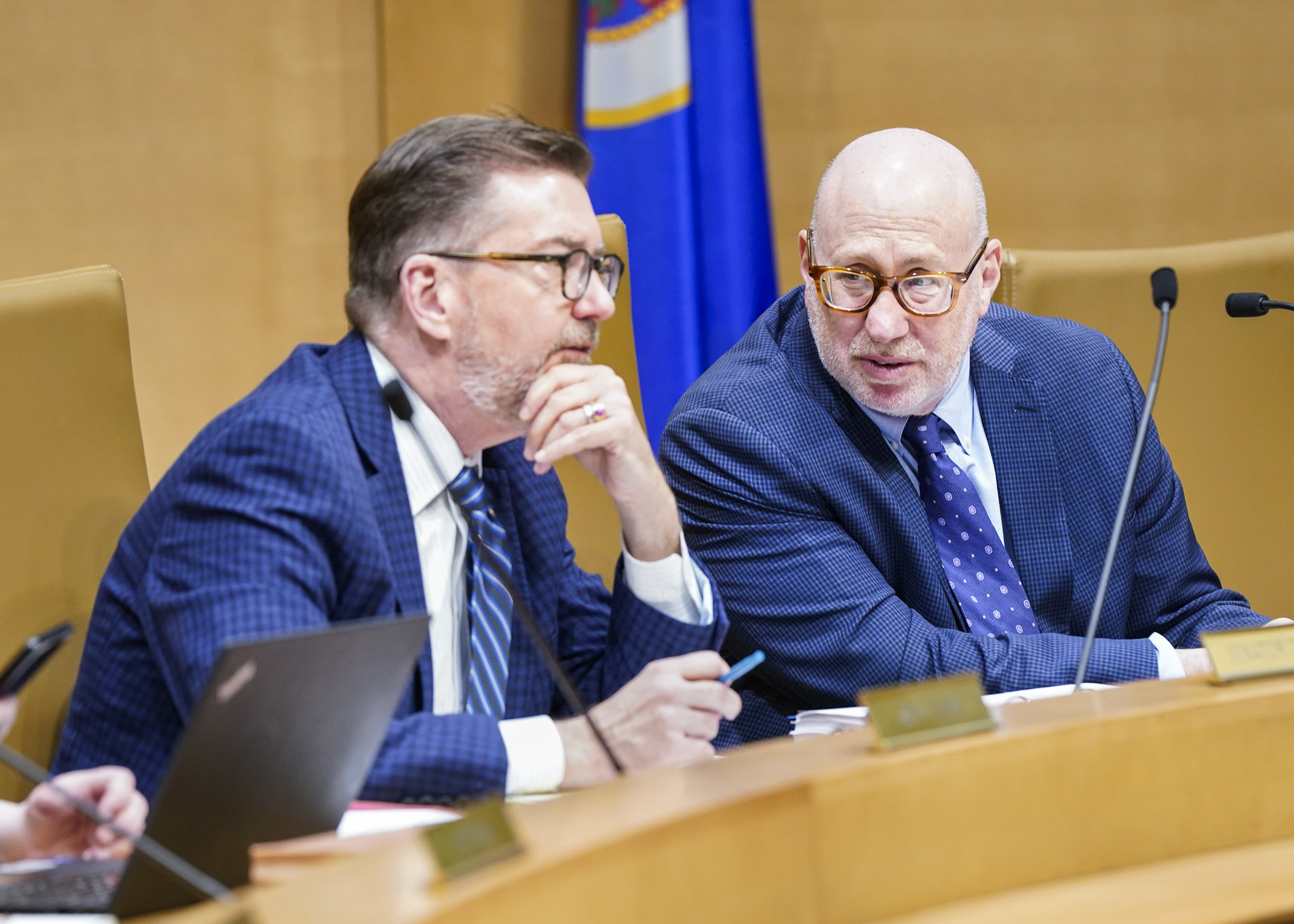Delivery fee, metro sales tax rate represent $350 million difference between omnibus transportation bills

As with anything big and complex — which is how Rep. Frank Hornstein (DFL-Mpls) characterizes the omnibus transportation finance and policy bill he sponsors — the devil is in the details. In this case, the details could add up to millions of dollars when it comes to new revenue to repair roads, reinforce bridges and replace buses.
That was clear Wednesday after a walkthrough heard by the conference committee tasked with finding the middle ground between the House and Senate transportation bills. Conferees plan to meet Thursday afternoon, Friday morning and probably over the weekend.
[MORE: Watch the meeting via Senate TV]
A major difference between HF2887*/SF3157 is proposals to fund transportation when revenue, gas tax and other user fees are not expected to keep pace with rising costs.
House provisions for a 75-cent retail delivery fee and a 0.75% metro area sales tax increase would raise about $350 million more per year than the Senate bill, which does not include the delivery fee and proposes a 0.5% sales tax increase.
Both bills aim to increase revenue for the Department of Transportation and Department of Public Safety by raising the motor vehicle sales tax, modifying the vehicle registration tax rate and depreciation schedule, dedicating all sales tax revenue from vehicle replacement parts to transportation, and increasing license application fees, although there are differences in precisely how soon and by how much.
Working with a target of $1.07 billion in additional General Fund spending for the next biennium, new allocations in the House bill would be $638.5 million to the Department of Transportation, $178.3 million to the Metropolitan Council, and $79.5 million to the Department of Public Safety.
The Senate bill would send $601 million more to the Department of Transportation, $227.3 million to the Metropolitan Council — including $50 million to extend the Blue Line light rail — and $83.5 million to the Department of Public Safety.
The chambers also take different tacks on trunk highway bonds. The House proposal would authorize $217.7 million in fiscal year 2024 with $87 million for MnDOT facilities, $80 million to repair bridges and $50 million to the Corridors of Commerce program.
The Senate has proposed $551 million through 2027 with $350 million for Corridors of Commerce and $200 million for state road construction projects. Half of that $200 million is targeted toward three projects — Highway 10 and Highway 65 in Anoka County and Highway 61 through Two Harbors.
And the Northern Lights Express passenger train between Duluth and the Twin Cities would be funded at $194.3 million in the House bill; $50 million in the Senate.
[MORE: View the spreadsheet]
The Senate bill includes a railroad safety package, including prompt notification requirements, chain of control provision, and preparedness exercises.
Other differences include:
- creating a disadvantaged communities car sharing grant program (Senate);
- offering a tax credit for up to $1,500 of the cost of an electric-assisted bicycle (Senate);
- clarifying drivers must move over for any vehicle with a flashing light (Senate);
- allow teleconference and online driver’s education classes (Senate);
- planning for a bike trail between Midtown Greenway in Minneapolis and Allianz Field in St. Paul (Senate); and
- creating three regions for Corridor of Commerce spending (House).
[MORE: View side-by-side comparisons of different sections: A, B, C, D, E, F, G, H]
Provisions included in both bills would:
- establish an Advisory Council on Traffic Safety;
- require a study on speed cameras;
- include adherence to greenhouse gas emission and vehicle miles reduction targets in road construction plans;
- add legal blindness as an eligibility criterion for a disability parking permit;
- prohibit holding a cell phone when driving;
- establish a Highways for Habitat program to encourage pollinator habitat in the right of ways;
- allow voluntary disclosure of race and ethnicity information on driver’s license applications;
- increase railroad inspectors from four to six; and
- rework transit rider conduct policies, creating a workforce to enforce rules and offer customer service.
Related Articles
Search Session Daily
Advanced Search OptionsPriority Dailies
Speaker Emerita Melissa Hortman, husband killed in attack
By HPIS Staff House Speaker Emerita Melissa Hortman (DFL-Brooklyn Park) and her husband, Mark, were fatally shot in their home early Saturday morning.
Gov. Tim Walz announced the news dur...
House Speaker Emerita Melissa Hortman (DFL-Brooklyn Park) and her husband, Mark, were fatally shot in their home early Saturday morning.
Gov. Tim Walz announced the news dur...
Lawmakers deliver budget bills to governor's desk in one-day special session
By Mike Cook About that talk of needing all 21 hours left in a legislative day to complete a special session?
House members were more than up to the challenge Monday. Beginning at 10 a.m...
About that talk of needing all 21 hours left in a legislative day to complete a special session?
House members were more than up to the challenge Monday. Beginning at 10 a.m...